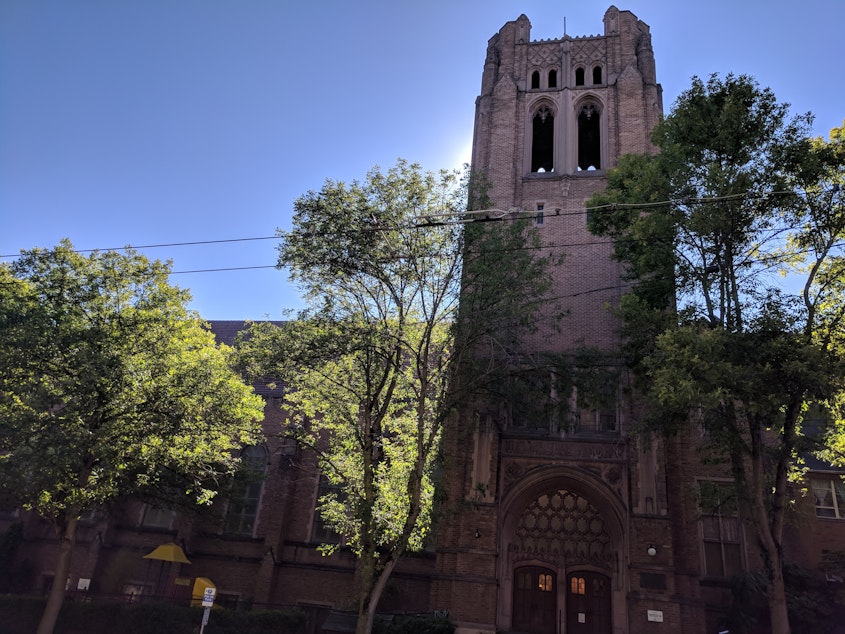Needle exchange, youth shelter to be displaced as U-District church torn down

Seattle’s University District is about to undergo a massive transformation.
Light rail is coming in, buildings are going to get taller, and some old businesses are moving out.
And not even churches are immune to the changes.
Near the corner of NE 43rd Street and 15th Avenue NE in the U-District there's an imposing gothic structure.
Its architecture speaks of grandeur and safe haven all at once.
Sponsored
This is the home of the University Temple United Methodist Church (UTUMC). It’s stood on this spot for nearly a century.
Now, the church is set to be redeveloped into a new church, condos and commercial space.
Leaders of the congregation say it’s the best way to remain sustainable and remain in the neighborhood.
The decision has been a long time coming. It took years of discussion and several studies to get to this point.
The buildings are aging, and UTUMC can’t afford the upkeep.
Sponsored
“We no longer have the financial resources to cope with the failure of a major building system, or to make the building earthquake-safe or ADA compliant,” Larry Erickson, Chair of UTUMC’s Building Committee, said in a statement. “Doing so would require millions of dollars the church simply doesn’t have."
Like many other churches, University Temple has seen a long decline in membership following a boom in attendance after World War II.
The large space still houses their congregation, but for decades now it's also been home to several non-profits.
These non-profits run meal programs, services for drug users and shelters, among other programs.
Reverend Pat Simpson, the pastor at University Temple, said the church doesn't charge non-profits enough in rent to keep up with the many repairs that time and hard use require. And they can't continue digging into their inherited funds.
Sponsored
So the congregation decided to tear down its old buildings and replace them with a new church, residential units that will be managed by a private developer, possibly some commercial space, and a spot for non-profits.
They're partnering with the nearby University Lutheran Church in the hopes that both congregations can exist and grow together.
Construction is still a few years off. The developer won’t be announced until the fall. But when it starts, it will mean places like the ROOTS homeless shelter for young adults, housed in the University Temple’s building, will be displaced.
The church has been discussing the redevelopment with their tenants for some time. It’s unclear at this time which nonprofits will return when the new buildings are complete and which won’t.
But, at least during construction, they’ll all need to find new space.
Sponsored
In a statement, the church said there will be financial assistance and help connecting tenants to new spaces during construction.
Kat Ousley, the shelter director at ROOTS, said they're uncertain where they'll end up during that time. Commercial space is expensive and hasn't been part of their budget up to now.
"We've relied on a good relationship with the church to have a great space for a reasonable price, so we'll try to find something else like that. I don't know what that will look like," Ousley said.
The U-District needle exchange, which provides services for drug users, is also housed in the University Temple space.
Shilo Jama heads the People’s Harm Reduction Alliance, the group that runs the exchange.
Sponsored
He said they don’t know what the future holds. But he said this could be a chance for the needle exchange to grow in the U-District, even if it ends up in a different space at the end of the day.
"We're going to find something and, you know, because of the price it might be something a little funky that we have to spend a lot of time fixing up, but that doesn't mean it won't be a beautiful space."
Whether it's temporary or permanent, the move that these non-profits are facing may soon be a reality for others too.
That’s according to Darel Grothaus, the project manager for University Temple.
He said these issues — aging buildings, declining membership, and service providers who pay minimal rent – aren’t unique to churches in the University District.
"There is a crisis affecting the city because many of these venues, unless there is intervention, are not going to be available for service providers. And there's been a really artificial subsidy of the rent because most congregations have charged either no rent or very nominal rent. Certainly not enough to pay for the upkeep" Grothaus said.
Reverend Simpson with University Temple said rents may get higher for non-profits when the new buildings are up.
But service providers would get newer, more reliable facilities and a say in how the space is designed.
"Instead of retrofitting something that was designed for other uses. And each of the organizations is going to have to decide whether that's a good investment," Simpson said.
Whatever the current tenants decide, Simpson said they'll always have service providers in their space.
And she said the church will remain committed to places like ROOTS and the needle exchange, whether they stay or move on.
